About the Publisher

We hope you enjoyed this book.
Since 1944, Mercier Press has published books that have been critically important to Irish life and culture. Books that dealt with subjects that informed readers about Irish scholars, Irish writers, Irish history and Irelands rich heritage.
We believe in the importance of providing accessible histories and cultural books for all readers and all who are interested in Irish cultural life.
Our website is the best place to find out more information about Mercier, our books, authors, news and the best deals on a wide variety of books. Mercier tracks the best prices for our books online and we seek to offer the best value to our customers, offering free delivery within Ireland.
Sign up on our website to receive updates and special offers.
www.mercierpress.ie
www.facebook.com/mercier.press
www.twitter.com/irishpublisher
Mercier Press, Unit 3b, Oak House, Bessboro Rd, Blackrock, Cork, Ireland
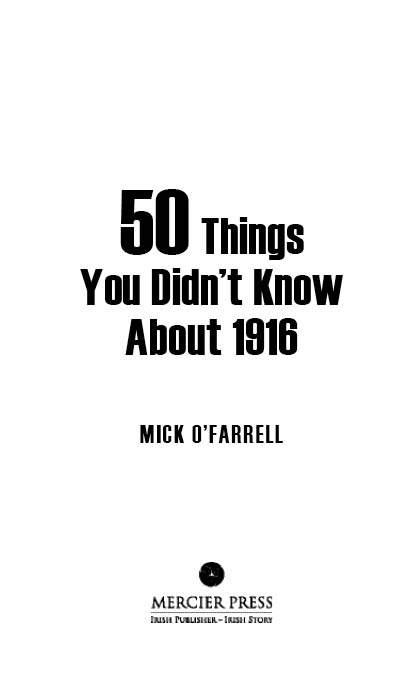
MERCIER PRESS
3B Oak House, Bessboro Rd
Blackrock, Cork, Ireland

www.mercierpress.ie

http://twitter.com/IrishPublisher

http://www.facebook.com/mercier.press
Mick OFarrell, 2009
ISBN: 978 1 85635 619 0
Epub ISBN: 978 1 78117 123 3
Mobi ISBN: 978 1 78117 124 0
This eBook is copyright material and must not be copied, reproduced, transferred, distributed, leased, licensed or publicly performed or used in any way except as specifically permitted in writing by the publishers, as allowed under the terms and conditions under which it was purchased or as strictly permitted by applicable copyright law. Any unauthorised distribution or use of this text may be a direct infringement of the authors and publishers rights and those responsible may be liable in law accordingly.
For three generations of OFarrell women, Amanda (ne Edwards), Eve and Ursula, who each provide support, inspiration and love in their own way: subtle and obvious, intended and unintended, consciously and unconsciously.
Contents
Acknowledgements
Many thanks to the following for providing information and, in some cases, material: Ursula OFarrell; Jimmy McDonagh; Derek Jones; Douglas S. Appleyard; John McGuiggan; Sarah McLoughlin; Karl Vines; Nick Goad; Michael J. Murray, TCD; Amanda Hyland, Laois County Library; Muriel McCarthy, Marshs Library; Andrew Hesketh, www.derbyshirelads.uwclub.net; Very Rev. Patrick Finn, St Marys, Haddington Road. Thanks also to Eoin Purcell and the team at Mercier Press for taking me on again.
Note: Every effort has been made to acknowledge the sources of all photographs used. Should a source not have been acknowledged, please contact Mercier Press and we will make the necessary corrections at the first opportunity.
Introduction
Ive been a student of the Easter Rising for a long time now, and in that time Ive learned many things. When my interest in the rebellion began, I used to think that since, at a very basic level, the Rising started and ended within a single week, it would be a finite area of study. How wrong I was! Fifteen years of reading and researching later, Im still experiencing the pleasure of learning new things, finding new unpublished sources, and chasing scarce publications. And yet there remains much more out there many facts waiting to be uncovered and connections waiting to be made.
There are, of course, some facts about the Easter Rising that are fairly widely known. Not everybody knows the details of that week in 1916, but a lot of people would know a little, and a few people would know a lot. This book is an attempt at presenting some of the many less well-known facts about the Rising and, as such, I hope it is of interest to people at all levels of knowledge. I dont mind admitting that I found out a few new things myself during my research!
The truth of it is that no matter how long a person spends reading and researching the Rising, many tales and facts will never be revealed things said in secret, acts of courage or cowardice unwitnessed, tales told to family and friends, never committed to paper and now lost, tales untold by men who saw, or perhaps did, things they chose not to recall.
All memories are fleeting, though, and if history is to be known to more than historians, then it is up to all of us to tell, to listen, to preserve how many of us have heard stories of times past and said we must write that down some day; only to try and tell the same story to a new audience and have trouble remembering this detail, or that name?
So if you have, or have heard, a family story about the Easter Rising (or any other historical event) write it down scribble it, type it, email it to yourself! Anything to keep it for yourself, for the next generation, for historians and non-historians. And if retaining it is a burden, send it to me, and Ill keep it for you!
When it comes to history, we can all look up the big events, the important dates, if we want to, in any number of books. But what interests me more are the so-called ordinary stories, the tales of the unimportant. What was it like to hear gunfire on Easter Monday and worry about getting enough bread the next day? What was it like to board a troop ship in Liverpool in the middle of the night, bound for who-knows-where, only to land in the unfamiliar port of Kingstown (Dun Laoghaire), to be cheered as you disembarked and to be shot at as you arrived in Mount Street? How did it feel to have your windows blown in by the booming of the artillery which the army was firing from outside your home?
Ordinary people lived through these extraordinary times and their tales deserve to be known, to be remembered, to be told.
Here then, are some extraordinarily ordinary, but fascinating, facts about the Easter Rising which you may not have known before now.
Mick OFarrell
December 2008
Authors Notes: apart from some small actions, the 1916 Rising lasted seven days, from Easter Monday, 24 April, to the following Sunday, 30 April. Therefore, when the text mentions a day, without giving a date, it can be assumed that the day referred to is one of the seven days between that Monday and Sunday.
The old and new name of Sackville/OConnell Street are used throughout the text Fact 34 explains why both names were valid in 1916.
. Looking the other way
To help the success of the Rising, the Volunteer leaders sought help from Britains enemy, Germany, in more ways than one there was the well-known arms shipment carried by the disguised vessel, the Aud, which ended up scuttled at the bottom of the sea ( see Fact 2 ). There was also the failed attempt by Roger Casement to establish an Irish Brigade from among Irishmen held prisoner in Germany.
In general, however, the German reaction was best described as lukewarm they flatly refused requests to land troops in Ireland and said that sending submarines into Dublin harbour was impossible. And although they did send a single arms shipment, it comprised weapons previously captured from the Russians and of debatable quality the rifles, which had been deemed good enough for Sinn Finers, were by no means modern, was one description.

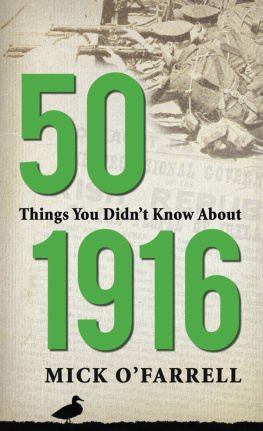
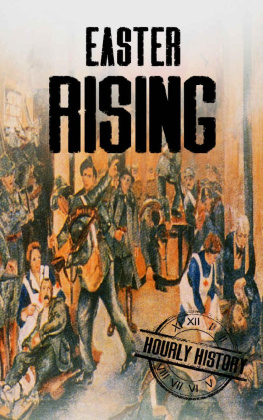

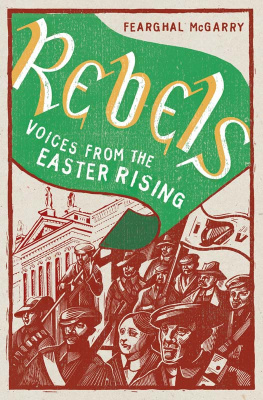
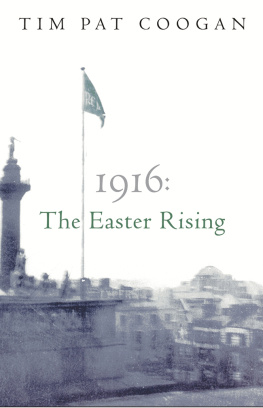
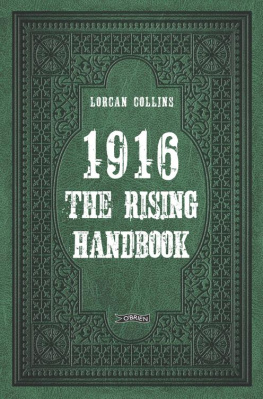
![Lorcan Collins [Lorcan Collins] - 1916: The Rising Handbook](/uploads/posts/book/143326/thumbs/lorcan-collins-lorcan-collins-1916-the-rising.jpg)
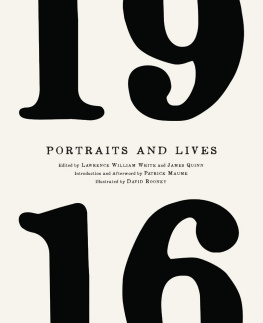
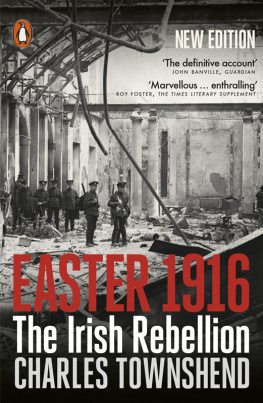
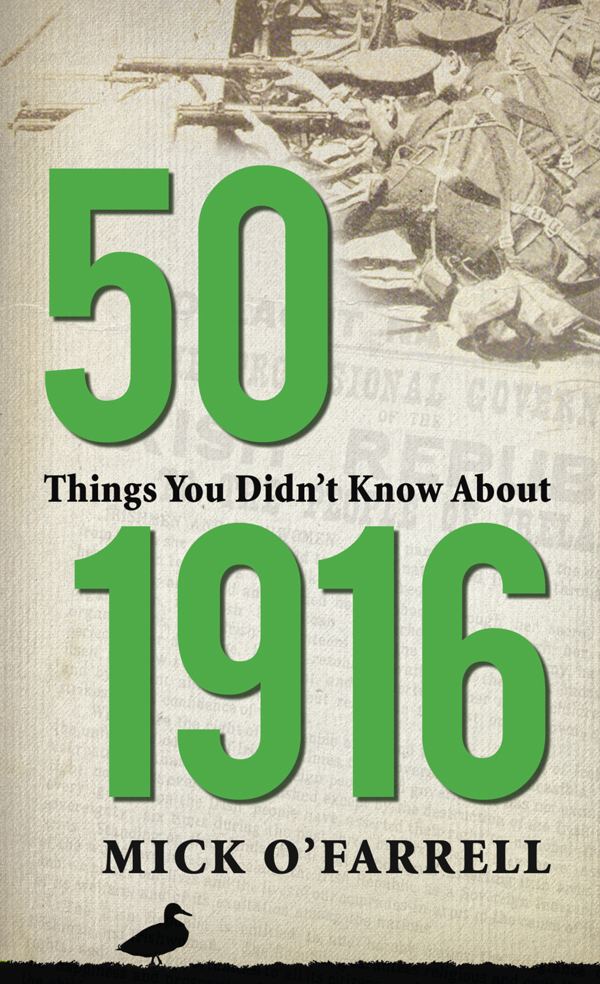


 www.mercierpress.ie
www.mercierpress.ie http://twitter.com/IrishPublisher
http://twitter.com/IrishPublisher http://www.facebook.com/mercier.press
http://www.facebook.com/mercier.press